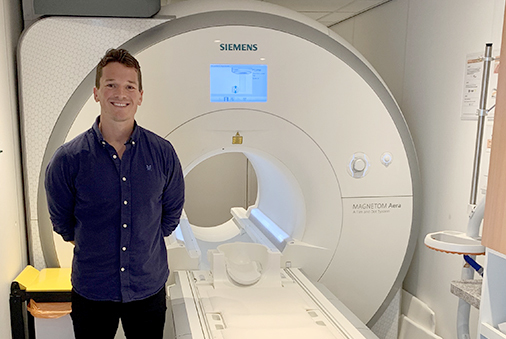Tom Waddell
Industrial Fellow 2020
Causal modelling of type 2 diabetes and multi-organ dysfunction through quantitative magnetic resonance imaging: Applying Bayesian-networks
Perspectum
University of Oxford
Tom is developing a computational model of type 2 diabetes to help predict patient outcomes and devise personalised medical interventions. Type 2 diabetes is a major cause of secondary complications such as cardiovascular disease, affecting 3.8 million adults and accounting for every 1 in 6 taken hospital beds in the UK. Type 2 diabetes can lead to multiple organ dysfunction, and is associated with liver disease, heart disease and obesity.
Accurately modelling the effects of type 2 diabetes on the body’s organs is a difficult challenge as it involves a complex interplay between various biological systems. Tom hopes to apply Bayesian networks – a type of graphical modelling that is well-suited to identifying causation in complex systems. Bayesian networks identify dependencies between data points or nodes, which allows them to make probabilistic predictions with incomplete data. Tom hopes to train his model using data from magnetic resonance imaging (MRI) of internal organs.
To date, no artificial intelligence-based model that incorporates MRI-derived biomarkers of multiple organs has been established to study type 2 diabetes. Tom plans to develop such a system and use it to test various hypothetical scenarios, using his model to devise personalised treatments.
Developing a computational model of type 2 diabetes that accurately predicts future health outcomes will significantly benefit drug development and clinical trial designs around the treatment of obesity and diabetes.
Tom holds a BSc degree in Sport and Exercise Science and a masters in Clinical Exercise Science, and is an Ironman triathlon enthusiast. He won first place in the 2018 Iceman Polar Arctic race, which involved camping in blizzard conditions and pulling a sled for over 100km in polar bear territory.
Tom has published papers on liver disease and nutrition, has completed placements at the University of British Columbia and the University of Oxford, and has worked on rehabilitation from clinical disease, including cardiovascular disease, within the NHS. Tom wants to apply his background in exercise physiology and lifestyle interventions to provide patients with an alternative to a lifelong dependency on medication.

“I feel extremely privileged for the opportunity to be a part of the 1851 family. This fellowship will allow me to study for my PhD and undertake valuable work in diabetes research, for which I feel very proud and extremely fortunate.”
